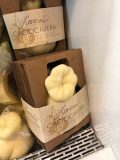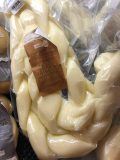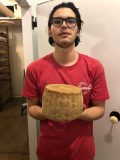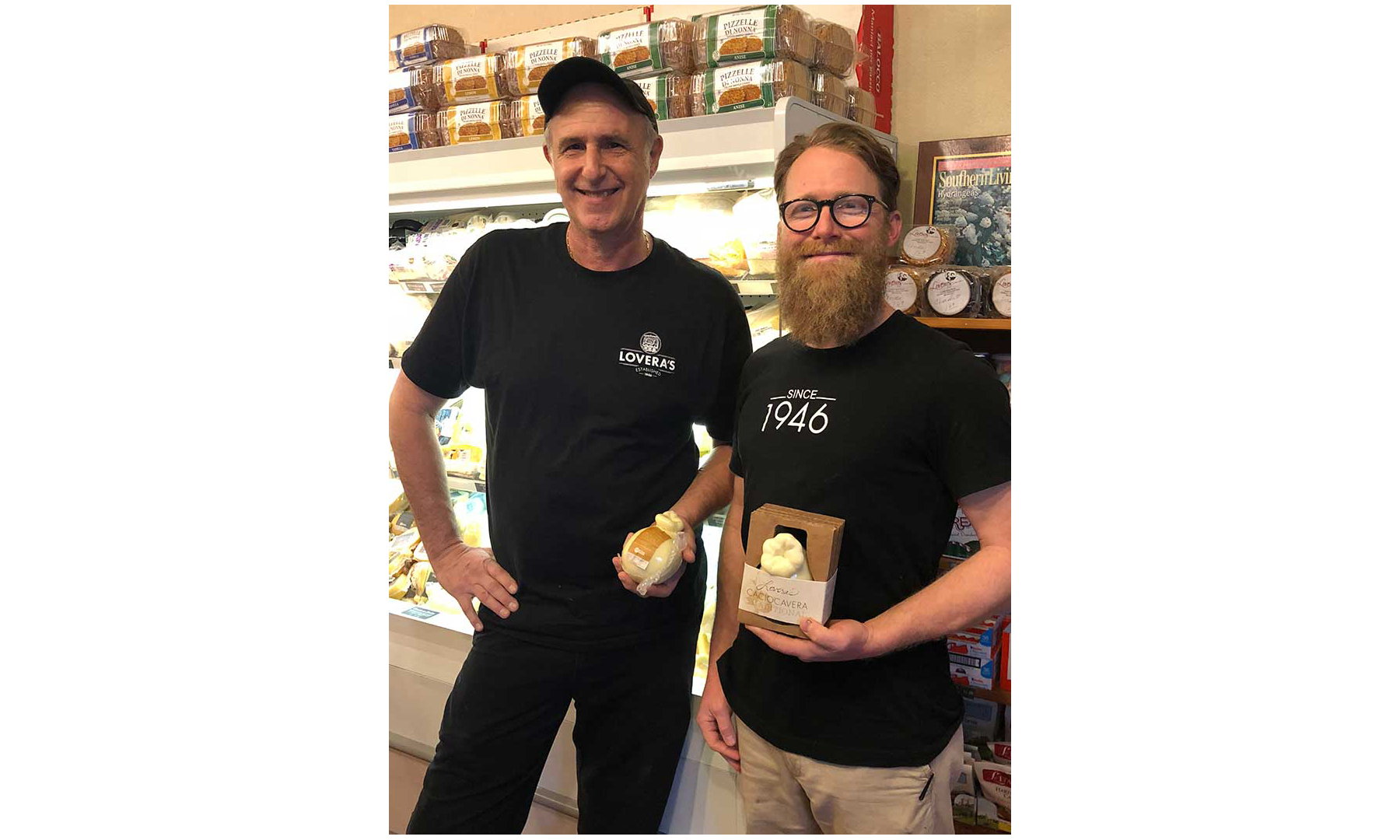by Terrie Ellerbee/editor-Southwest
Caciocavera is the signature cheese of Lovera’s Handcrafted Foods in Krebs, Oklahoma. The name is a play on the Italian caciocavallo (literally “horse cheese”). It keeps with a tradition born in Southern Italy some 500 years before Christ walked the earth. Cheeses were tied one to the other and transported to market by horseback.
Lovera’s Caciocavera is a gourd-shaped cheese tied together with butcher twine and hung to dry. That keeps mold from building up on it while it dries and cures.
Lovera’s Caciocavera is available in Italian herb, smoked and the spicy Caciocavera Diavolo that is rubbed with cayenne, ghost pepper powder and crushed red pepper.

In 2017, Lovera’s received three American Cheese Society awards. It garnered a first-place award in the Smoked Cheese category for its Hickory Smoked Braided Caciocavera, which is hand braided, salt brined and slow smoked with real hickory wood. Lovera’s brought home a second place for its Smoked Caciocavera and third place in the Pasta Filata category for its traditional Caciocavera.
Lovera’s cheeses are shaped by hand. Aged Caciocavera is made with raw milk and aged for at least 60 days before it is sold.
“It allows a little more flavor development,” said cheesemaker Shawn Duffy. “It’s has a little more of a provolone flavor to it.”
The company produces mixed-milk cheese from cow and goat milk as well as sheep’s milk.
“What we’ve tried to do is create an inclusive Italian cheese line, so we have different styles that reflect different types of Italian cheese out there,” Duffy said. “We have our Caciocavera line, which is like provolone, mozzarella-style cheese, and then we have what’s called Toma, which is an Alpine-style cheese. That would be a sheep’s milk rendition. We have a cow’s milk one, Oklahoma Toma. And a new rendition cow’s milk cheese called Tomina Vecchia.”
The latter was soon to be in front of buyers for Central Market, Duffy told The Shelby Report’s Jan Meade.
Lovera’s also has been paring up with breweries. It has introduced a Prairie Artisan Ales Bomb!, for example. The beer cheese product will capitalize on the popularity of craft beer. Prairie Artisan Ales is a brewery in Tulsa.
“It is world famous and about three blocks down the road,” Duffy said.

Duffy said the company also has worked with COOP Ale Works in Oklahoma City and 4 Hands Brewing Co. in St. Louis and hopes to collaborate with Four Corners Brewing Co. in Dallas and some Colorado-based breweries as well.
Lovera’s also offers spreadable goat cheeses under its Caprino Di Krebs label and some blue cheeses, including Blue Thunder and Desertetto Blua, which is named in honor of owner Sam Lovera’s grandmother, Marta Blua, who lived in the village of Desertetto di Valdieri in the Piedmont region of Northern Italy.
Lovera, who also is Duffy’s father-in-law, said his family never made cheese until 1994. Lovera’s had been buying locally made Caciocavallo cheese from Italian families in the area and reselling it in its retail store since 1946.
“We never had enough cheese. Local women would bring it in, and it would be gone within a day,” Lovera said. “The economy here is pretty much up and down with the oil and gas. It was in one of those troughs that business was just dead.”
He asked his brother, Mike, why they didn’t start making the cheese themselves.
“Some local people taught us how in the back kitchen—actually on the stove—and it worked so well we decided to build a cheese plant,” Lovera said.
He went to Wisconsin to buy the proper equipment and the plant opened in 1994. Since 2008, when Duffy became the head cheesemaker, the company’s cheese sales have quadrupled. In 2013, the company took over a cheese processing plant in Ada.
“We went from making one kind of cheese to about 40,” Lovera said. “We have two different plants and we’re in about eight states now.”
Story continues below
Keeping it in the family

Matteo Lovera is Sam Lovera’s grandson. While giving Meade a tour of the Krebs facility, Matteo said the company trademarked the Caciocavera name because only cheese made in Italy can be called Caciocavallo.
“Caciocavera can only be made in Krebs, Oklahoma, with the Jersey cow milk we get at Clarita (Oklahoma), so it’s actually in and of itself an exclusive recipe, just like Caciocavallo in Italy,” Matteo said. “We try to keep that same exclusive culture with the recipe.”
Jersey cow milk is good for making the buttery cheese due to its high butter fat content.
What Matteo finds most fascinating is what the French call “terroir.”
“It is the character and flavor of something based upon the geographical region where it’s made,” he said. “With small artisan cheesemakers like us, you’re actually capturing a taste of this place. You’re getting microorganisms from the farm, microorganisms in our aging rooms. The natural microflora in the air is contributing to that character of your cheese. It actually has a unique flavor based upon this area. That’s where my heart’s at.”
He said there basically are three steps to making cheese: production, drying and aging.
The milk is brought in at about 2:30 a.m., and the cheese making process begins. Once the curd is made, it is heated and stretched into the proper shape. Then the longer cheese is aged, the more pronounced the flavor becomes.

“You can make one recipe and make 10 different cheeses out of that depending on how you age it, the cultures you add to that and the flavorings of course,” Matteo said. “With all cheese, it is finding that balance within the process. There is a prime time. There are control points that you are monitoring throughout the process—the acidity, the saltiness and, depending on the style, it has to fit a certain category to be that style of cheese.”
Cheese originally was made as a way to preserve milk. Taste took a back seat.
“Now we’re trying to make really tasty cheese, and it’s actually a lot more difficult than people think to make cheese that tastes good,” Matteo said.
Ultimately, Lovera’s wants to bring great cheese to the masses. Matteo said while there may not be a lot of fine cheese connoisseurs in Krebs, Oklahoma, they do appreciate the local product.
“We make pretty simple cheeses,” he said. “The goal we have as a cheese company is to make cheeses that are approachable for everybody,” Matteo said. “When we come to a person who has never had this kind of cheese, we want them to say it’s actually pretty good, not ‘that just kicked me in the teeth.’”
Keep reading:
Harmons Specialty Cheese Buyer Honored By International Organization
https://www.theshelbyreport.com/2017/12/29/specialty-cheese-trends-2018/

